| Listing 1 - 10 of 14 | << page >> |
Sort by
|
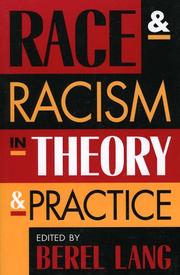
ISBN: 0847696936 0847696928 Year: 2000 Publisher: Lanham, Md Rowman & Littlefield
Abstract | Keywords | Export | Availability | Bookmark
 Loading...
Loading...Choose an application
- Reference Manager
- EndNote
- RefWorks (Direct export to RefWorks)
Sociology of minorities --- Race --- Racism --- Racisme --- Bias, Racial --- Race bias --- Race prejudice --- Racial bias --- Prejudices --- Anti-racism --- Race relations --- Physical anthropology --- Critical race theory
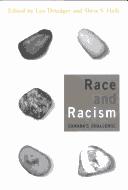
ISBN: 1282864319 9786612864315 0773574220 9780773574229 9781282864313 0886293650 9780886293659 0886293626 9780886293628 Year: 2000 Publisher: Montreal [Que.] Published for Carleton University by McGill-Queen's University Press
Abstract | Keywords | Export | Availability | Bookmark
 Loading...
Loading...Choose an application
- Reference Manager
- EndNote
- RefWorks (Direct export to RefWorks)
Race and Racism brings together critical contributions from the academic and government sectors that analyse the nature and extent of racism in Canada. The broad spectrum of social scientific approaches represented here - sociology, cultural anthropology, demography, and psychology - and an equal emphasis on quantitative and qualitative methods make this study a particularly rich source for scholars and policy makers alike. Discussion unfolds along four main themes: concepts and theories relating to race (including some treatment of measurement questions), economic and social factors pertaining to race, racism, and discrimination (as represented in opinion and popular perception, measured in various ways), and the dimensions of minority coping in major urban areas. Race and Racism fills in many wavering lines on our cultural landscape and provides an important perspective on social policy for the twenty-first century.
Canada -- Race relations -- Congresses. --- Racism -- Canada -- Congresses. --- Racism --- Canada --- Regions & Countries - Americas --- History & Archaeology --- Bias, Racial --- Race bias --- Race prejudice --- Racial bias --- Prejudices --- Anti-racism --- Critical race theory --- Race relations
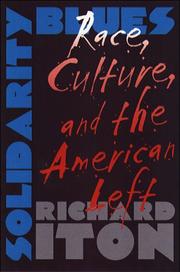
ISBN: 080786076X 9780807860762 0807825360 0807848476 9780807825365 9780807848470 0807825360 9780807825365 9798890867834 Year: 2000 Publisher: Chapel Hill University of North Carolina Press
Abstract | Keywords | Export | Availability | Bookmark
 Loading...
Loading...Choose an application
- Reference Manager
- EndNote
- RefWorks (Direct export to RefWorks)
A number of arguments have been made to explain the relative weakness of the American Left. A preference for individualism, the effects of prosperity, and the miscalculations of different components of the Left, including the labor movement, have been cited, among other factors, as possible explanations for this puzzling aspect of American exceptionalism. But these arguments, says Richard Iton, overlook a crucial factor--the powerful influence of race upon American life.Iton argues that the failure of the American Left lies in its inability to come to grips with the centrality of race
Racism --- Radicalism --- Right and left (Political science) --- Socialism --- Bias, Racial --- Race bias --- Race prejudice --- Racial bias --- Prejudices --- Anti-racism --- Critical race theory --- Race relations --- Political aspects --- History --- United States --- Political aspects. --- Politics and government
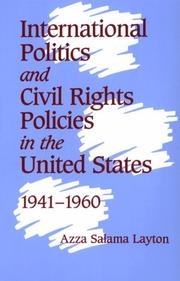
ISBN: 0511808771 0521660025 0521669766 Year: 2000 Publisher: Cambridge : Cambridge University Press,
Abstract | Keywords | Export | Availability | Bookmark
 Loading...
Loading...Choose an application
- Reference Manager
- EndNote
- RefWorks (Direct export to RefWorks)
Despite the impressive volume of literature on the civil rights movement and US race policies, the connection between American foreign policy during World War II and the postwar years and America's race policy remains largely unexplored. Focusing on this gap, Professor Layton's book shows that the revolutionary changes in world politics in the wake of WWII created new opportunities and pressure points for reforming US race policies. The Holocaust, the dismantling of colonial empires, the Cold War, and the establishment of the United Nations had a major impact in creating the Executive and Judicial branch of the Federal government shifts from a seventy year old hands-off policy to the advocacy of civil rights reform. This book further reveals how civil rights leaders utilized foreign policy issues and Cold War politics to press for domestic policy reforms in the United States.
African Americans --- Racism --- Bias, Racial --- Race bias --- Race prejudice --- Racial bias --- Prejudices --- Anti-racism --- Critical race theory --- Race relations --- Civil rights --- History --- Political aspects --- United States --- Foreign relations --- Race relations. --- Politics and government --- Race question --- Social Sciences --- Political Science
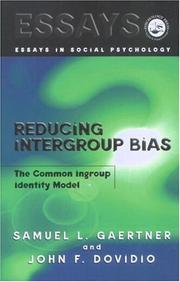
ISBN: 0863775713 Year: 2000 Publisher: Philadelphia (Pa) Psychology Press
Abstract | Keywords | Export | Availability | Bookmark
 Loading...
Loading...Choose an application
- Reference Manager
- EndNote
- RefWorks (Direct export to RefWorks)
This book examines how intergroup biases, including subtle, contemporary forms of racism, can be combated. Specifically, the book begins by tracing how the challenges of addressing aversive racism, an indirect and typically unconscious type of racial bias, led to the development of the Common Ingroup Identity Model. This model outlines strategies for reducing biases that are rooted, in part, in fundamental, normal psychological processes, such as the categorization of people into in-groups, "we's who are favored," and out-groups, "they's who are not." Thus, changing the nature of categorization from in-groups and out-groups (e.g., on the basis of race) to one more common, inclusive identity (e.g., university affiliation or nationality) can harness the cognitive and motivational forces of ingroup favoritism and redirect them to reduce bias. This process, described by the Common Ingroup Identity Model, not only produces more positive intergroup attitudes and more inclusive and generous standards ofjustice and fairness but also increases positive and trusting intergroup behaviors, such as helping and personal disclosure. The book considers situations and interventions that can foster more inclusive representations and ways, both theoretically and practically, that a common ingroup identity can facilitate more harmonious intergroup relations.
Intergroup relations. --- Discrimination --- Racism --- Relations intergroupes --- Racisme, Lutte contre le --- Prevention. --- Prévention --- Intergroup relations --- Prevention --- #PBIB:2001.1 --- Sociale psychologie --- groepsdynamica --- groepsdynamica. --- Prévention --- Bias, Racial --- Race bias --- Race prejudice --- Racial bias --- Prejudices --- Anti-racism --- Race relations --- Conflict, Intergroup --- Intergroup conflict --- Relations, Intergroup --- Social interaction --- Bias --- Interpersonal relations --- Minorities --- Toleration --- Critical race theory
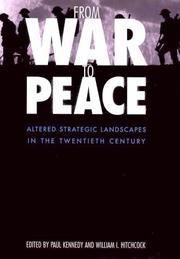
ISBN: 0300080107 9780300147483 0300147481 9780300080100 Year: 2000 Publisher: Yale University Press
Abstract | Keywords | Export | Availability | Bookmark
 Loading...
Loading...Choose an application
- Reference Manager
- EndNote
- RefWorks (Direct export to RefWorks)
In this timely collection, a dozen leading scholars of international affairs consider the twentieth century's recurring failure to construct a stable and peaceful international order in the wake of war. Why has peace been so hard to build? The authors reflect on the difficulties faced by governments as they sought a secure world order after the First World War, the Second World War, and the Cold War.Major wars unleashed new and unexpected forces, the authors show, and in post-war periods policymakers were faced not only with the reappearance of old power-political issues but also with quite unforeseen challenges. In 1918, a hundred-year-old order based on a balance of power among the states of Europe collapsed, leaving European and American leaders to deal with social, ideological, and ethnic crises. After World War II, hopeful plans for peace were checked by nuclear rivalry, international economic competition, and colonial issues. And unexpected challenges after the Cold War-global economic instability, ethnic conflict, environmental crises-joined with traditional security threats to cast a pall again over international peace efforts. In drawing out historical parallels and comparing how major states have adapted to sharp and sudden changes in the international system during the twentieth century, this book offers essential insights for those who hope to navigate toward peace across today's altered and uncertain strategic landscape.Contributors to this volume:Carole Fink, Gregory Flynn, William I. Hitchcock, Michael Howard, Paul Kennedy, Diane B. Kunz, Melvyn P. Leffler, Charles S. Maier, Tony Smith, Marc Trachtenberg, Randall B. Woods, Philip Zelikow
World politics --- Nationalism --- Racism --- Politique mondiale --- Nationalisme --- Racisme --- History --- Histoire --- History & Archaeology --- History - General --- Colonialism --- Global politics --- International politics --- Political history --- Political science --- World history --- Eastern question --- Geopolitics --- International organization --- International relations --- Bias, Racial --- Race bias --- Race prejudice --- Racial bias --- Prejudices --- Anti-racism --- Critical race theory --- Race relations

ISBN: 2082127052 9782082127059 Year: 2000 Publisher: Paris: Flammarion,
Abstract | Keywords | Export | Availability | Bookmark
 Loading...
Loading...Choose an application
- Reference Manager
- EndNote
- RefWorks (Direct export to RefWorks)
L'auteur, philosophe spécialisé dans l'histoire des sciences, analyse les multiples liens tissés depuis le XIXe jusqu'à nos jours entre la biologie et les pratiques et discours dans la société. Il montre comment certaines idéologies véhiculées par la biologie nourrissent les idéologies politiques, de l'eugénisme au racisme, en passant par le darwinisme social.
Racism --- Eugenics --- Genetics --- Ideology --- Racisme --- Eugénisme --- Génétique --- Idéologie --- History --- Histoire --- Eugenics. --- Human biology. --- Human genetics. --- evolutietheorie (evolutieleer, darwinisme) --- eugenetica (eugenese, eugenetiek) --- sociologie (sociologische aspecten) --- théorie de l'évolution (darwinisme) --- eugénisme (eugénique) --- sociologie (aspects sociologiques) --- Eugénisme --- Génétique --- Idéologie --- Human biology --- Human genetics --- Bias, Racial --- Race bias --- Race prejudice --- Racial bias --- Homiculture --- Race improvement --- Prejudices --- Anti-racism --- Critical race theory --- Race relations --- Heredity, Human --- Physical anthropology --- Biology --- Euthenics --- Heredity --- Involuntary sterilization
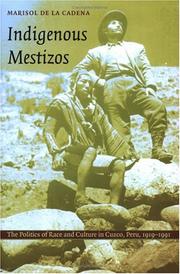
ISBN: 0822324202 0822323850 9780822324201 9780822323853 0822397021 Year: 2000 Publisher: Durham (N.C.) : Duke university press,
Abstract | Keywords | Export | Availability | Bookmark
 Loading...
Loading...Choose an application
- Reference Manager
- EndNote
- RefWorks (Direct export to RefWorks)
In the early twentieth century, Peruvian intellectuals, unlike their European counterparts, rejected biological categories of race as a basis for discrimination. But this antiracist ideology did not eliminate social hierarchies; instead, it redefined racial categories as cultural differences, such as differences in education or manners. In "Indigenous Mestizos", Marisol de la Cadena traces the history of the notion of race from this turn-of-the-century definition to a current denial of the definition's scientific validity. De la Cadena's ethnographically and historically rich study examines how indigenous citizens of the city of Cuzco have been conceived by others as well as how they have viewed themselves and places these conceptions within the struggle for political identity and representation.Demonstrating that the terms Indian and mestizo are complex, ambivalent, and influenced by social, legal, and political changes, she provides close readings of everyday concepts such as marketplace identity, religious ritual, grassroots dance, and popular culture, as well as of such common terms as respect, decency, and education. She shows how Indian has come to mean an indigenous person without economic and educational means - one who is illiterate, impoverished, and rural. Mestizo, on the other hand, has come to refer to an urban, usually literate, and economically successful person claiming indigenous heritage and participating in indigenous cultural practices.De la Cadena argues that this version of de-Indianization - which, rather than assimilation, is a complex political negotiation for a dignified identity - does not cancel the economic and political equalities of racism in Peru, although it has made room for some people to reclaim a decolonised Andean cultural heritage. This highly original synthesis of diverse theoretical arguments brought to bear on a series of case studies will be of interest to scholars of cultural anthropology, post-colonialism, race and ethnicity, gender studies, and history, in addition to Latin Americanists.
Mestizos --- Indians of South America --- Racism --- #SBIB:39A74 --- #SBIB:39A6 --- Bias, Racial --- Race bias --- Race prejudice --- Racial bias --- Prejudices --- Anti-racism --- Race relations --- American aborigines --- American Indians --- Indigenous peoples --- Eurindians (Latin America) --- Hispano-Indians (Latin America) --- Mestiços --- Indians --- Latin Americans --- Racially mixed people --- Social conditions. --- Mixed descent --- Etnografie: Amerika --- Etniciteit / Migratiebeleid en -problemen --- Ethnology --- Cuzco (Peru) --- Social conditions --- Critical race theory --- Cusco (Cuzco, Peru) --- Qosqo (Peru) --- Cosco (Peru) --- Cozco (Peru) --- Cusco (Peru) --- Mestizos - Peru - Cuzco - Social conditions --- Indians of South America - Mixed descent - Peru - Cuzco --- Racism - Peru - Cuzco --- Cuzco (Peru) - Social conditions
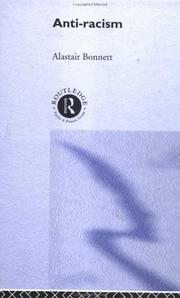
ISBN: 9781134695904 1134695918 0203976096 9780203976098 9780415171199 0415171199 9780415171205 0415171202 0415171199 0415171202 9786610148677 6610148678 1280148675 9781280148675 9781134695911 9781134695867 113469590X Year: 2000 Publisher: London New York Routledge
Abstract | Keywords | Export | Availability | Bookmark
 Loading...
Loading...Choose an application
- Reference Manager
- EndNote
- RefWorks (Direct export to RefWorks)
This introductory text provides students for the first time with an historical and international analysis of the development of anti-racism. Drawing on sources from around the world, the author explains the roots and describes the practice of anti-racism in Western and non-Western societies from Britain and the United States to Malaysia and Peru. Topics covered include:* the historical roots of anti-racism* race issues within organisations* the practice of anti-racism* the politics of backlash.This lively, concise book will be an indispensable resource for a
Racism. --- Race relations. --- Race awareness. --- Cultural pluralism. --- Equality. --- Multicultural education. --- Intercultural education --- Education --- Culturally relevant pedagogy --- Egalitarianism --- Inequality --- Social equality --- Social inequality --- Political science --- Sociology --- Democracy --- Liberty --- Cultural diversity --- Diversity, Cultural --- Diversity, Religious --- Ethnic diversity --- Pluralism (Social sciences) --- Pluralism, Cultural --- Religious diversity --- Culture --- Cultural fusion --- Ethnicity --- Multiculturalism --- Awareness --- Ethnopsychology --- Ethnic attitudes --- Integration, Racial --- Race problems --- Race question --- Relations, Race --- Ethnology --- Social problems --- Ethnic relations --- Minorities --- Racism --- Bias, Racial --- Race bias --- Race prejudice --- Racial bias --- Prejudices --- Anti-racism --- Critical race theory --- Race relations --- Culturally sustaining pedagogy
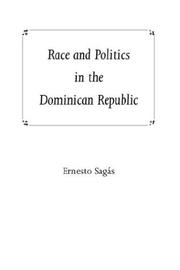
ISBN: 0813023912 9780813023915 0813017637 9780813017631 0813025699 9780813025698 Year: 2000 Publisher: Gainesville, FL
Abstract | Keywords | Export | Availability | Bookmark
 Loading...
Loading...Choose an application
- Reference Manager
- EndNote
- RefWorks (Direct export to RefWorks)
Racism --- Bias, Racial --- Race bias --- Race prejudice --- Racial bias --- Prejudices --- Anti-racism --- Critical race theory --- Race relations --- Dominican Republic --- Haiti --- Dominika Kyōwakoku --- Dominikaaninen tasavalta --- Dominikanische Republik --- Dominikanska republiken --- Quisqueya --- República Dominicana --- Republiḳah ha-Dominiḳanit --- République dominicaine --- San Domingo --- רפובליקה הדומיניקנית --- ドミニカ共和国 --- Santo Domingo (Spanish colony) --- Ayiti --- Bohio --- Haichi --- Hayti --- Haytian Republic --- Repiblik Ayiti --- Repiblik d Ayiti --- Republic of Haiti --- République d'Haïti --- ハイチ --- هايتي --- Гаити --- Gaiti --- Saint-Domingue --- Race relations. --- History. --- Relations --- Sociology of minorities --- History of Latin America
| Listing 1 - 10 of 14 | << page >> |
Sort by
|

 Search
Search Feedback
Feedback About UniCat
About UniCat  Help
Help News
News